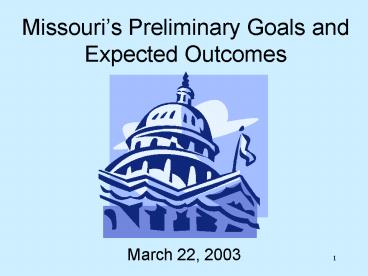Missouris Preliminary Goals and Expected Outcomes - PowerPoint PPT Presentation
1 / 20
Title:
Missouris Preliminary Goals and Expected Outcomes
Description:
Percent and number of Missourians with an Associates degree or higher. 13 ... Retention rate of Missouri Associate and Baccalaureate graduates ... – PowerPoint PPT presentation
Number of Views:29
Avg rating:3.0/5.0
Title: Missouris Preliminary Goals and Expected Outcomes
1
Missouris Preliminary Goals and Expected
Outcomes
- March 22, 2003
2
Preliminary Goals
- Publish a Report on the State of Missouris
Workforce by December 2003. - Design and Deploy a Workforce System Performance
Scorecard by December 2003. - Missouri Career Centers Will Become a Pipeline of
Referrals to Vocational Education and Community
Colleges.
3
Preliminary Goals (cont.)
- Identification of Essential and Technical Skills
Needed by Business/Industry. - Community College Realignment.
4
Workforce System Performance Scorecard
- Targeted Outcomes
- Connecting Student to Careers K-12 Outcome
Measures - Adult and Lifelong Learning Outcome Measures
- Quality of Life Outcome Measures
- Businesses Outcome Measures
5
Connecting Student to Careers K-12 Outcome
Measures
- Percent and number of students testing at
proficient or above on the MAP/TIIMS, ACT and
Terra Nova - High school graduation and GED pass rates
- Percent and number of students transitioning to
jobs with wages above the county average
without remedial training. - Percent and number of students transitioning to
post-secondary education without remedial
education.
6
Students Transitioning Without Remedial Education
- Strategies
- Establish a baseline on the percent and number of
students transitioning to post-secondary
education without remedial education - Establish a performance baseline regarding
referrals from Missouri Career Centers to
education and training providers
7
Students Transitioning (cont.)
- Strategies
- Provide career path information to students
including supply/demand gap analyses that
identify growth occupation - Utilize the Counselor Academy to help counselors
work with students and parents to explore choices
and options job shadowing - Expand access to community college and technical
education, resulting in greater affordability for
students, particularly those from low-income
families
8
Students Transitioning (cont.)
- Strategies
- Scale statewide business/labor/education
partnership best practices found in high
performance schools. - A-Team available to assist regions, communities
and schools to improve student outcomes. - Identification of essential and technical skills
needed by business and industry
9
Businesses Outcome Measures
- Percent and number of regional targeted industry
companies able to find qualified (skilled)
candidates. - Strategies
- Provide career path information to students and
job-seekers, and supply/demand gap analyses that
identify growth occupation trends to communities
10
Businesses Finding Qualified (Skilled) Candidates
- Strategies
- Utilize the Counselor Academy to help counselors
work with students and parents to explore choices
and options job shadowing - Identification of essential and technical skills
needed by business and industry - Provide the education and training curricula and
capacity to provide essential and technical
skills in a just-in-time basis
11
Businesses Finding Qualified (Skilled) Candidates
- Strategies
- Increase the number of students and adults
pursuing career paths in regional targeted
industry occupations - Increase the number of referrals from Missouri
Career Centers to private/public education and
training providers
12
Missourians with High School Diplomas or GEDs
- Measures
- Percent and number of Missourians with a high
school diploma or GED - Percent and number of Missourians with a post
high school certificate or credential - Percent and number of Missourians who are
literate - Percent and number of Missourians with an
Associates degree or higher
13
Missourians with High School Diplomas or GEDs
- Retention rate of Missouri Associate and
Baccalaureate graduates - Percent and number of Missourians who are
actively engaged in learning skill-based
training
14
Missourians with High School Diplomas or GEDs
- Strategies - Measure No. 1
- All Missouri Career Centers will provide access
to GED/ESL. - Career Boot Camp for youth who have dropped out
of school. - Establish Career Academies on community and
technical college campuses (residential).
15
Missourians with High School Diplomas or GEDs
- Strategies - Measure No. 1
- All TANF clients without a high school diploma or
GED will participate in the Missouri Career
Center GED program or and on-line GED program.
16
Missourians with High School Diplomas or GEDs
- Strategies - Measure No. 2
- Expand inventory of Web-based short term
instructional and training modules and make
available to any education and training provider.
17
Missourians with High School Diplomas or GEDs
- Strategies - Measure No. 3
- All Missouri Career Center will offer literacy
programs. - Local Workforce Investment Boards to build
coalitions of faith-based organizations,
community action agencies, and representatives of
local businesses to establish literacy
improvement programs in their region.
18
Missourians with High School Diplomas or GEDs
- Strategies - Measure No. 4
- Maintain the states community and technical
colleges as points of low cost access to post
secondary education. - Increase participation in the States community
and technical college out of district
instructional and training sites.
19
Missourians with High School Diplomas or GEDs
- Strategies - Measure No. 6
- Expand programming available through the states
electronic delivery system. - Showcase Regional Technical Education Councils
(RTECs) best practices. - Develop additional private/public partnerships to
increase business profitability and worker
employability.
20
Missourians with High School Diplomas or GEDs
- Strategies - Measure No. 6
- Design and deploy distance learning programs in
targeted industry and occupational clusters, and
thereby reduce duplication and establish skill
standards.































